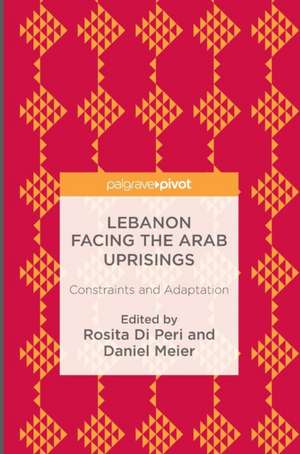Lebanon Facing The Arab Uprisings: Constraints and Adaptation
Editat de Rosita Di Peri, Daniel Meieren Limba Engleză Hardback – 10 noi 2016
This book provides an intimate picture of Lebanon, exploring the impacts of the Arab uprisings of 2011 which are deeply affecting Lebanese politics and society. The book examines Lebanon’s current issues and its deep sectarian divisions, as well as the ways in which it still seems able to find some adaptation paths to face the many challenges left by its regional sectarian and political polarization. Authors delve into border regions, Syrian refugees, the welfare state, the Lebanese Army, popular mobilisations in 2011 and the two main communities, the Sunnis and the Shia. Built on various fieldwork researches, the volume explores each of the topics through the lenses of identification building processes, the re-ordering of social and/or political relations, and the nationhood symbols and meanings.
Preț: 419.06 lei
Nou
Puncte Express: 629
Preț estimativ în valută:
80.18€ • 83.95$ • 66.35£
80.18€ • 83.95$ • 66.35£
Carte tipărită la comandă
Livrare economică 05-19 aprilie
Preluare comenzi: 021 569.72.76
Specificații
ISBN-13: 9781352000047
ISBN-10: 1352000040
Pagini: 167
Ilustrații: XIII, 162 p. 6 illus.
Dimensiuni: 148 x 210 mm
Greutate: 0.36 kg
Ediția:1st ed. 2017
Editura: Palgrave Macmillan UK
Colecția Palgrave Pivot
Locul publicării:London, United Kingdom
ISBN-10: 1352000040
Pagini: 167
Ilustrații: XIII, 162 p. 6 illus.
Dimensiuni: 148 x 210 mm
Greutate: 0.36 kg
Ediția:1st ed. 2017
Editura: Palgrave Macmillan UK
Colecția Palgrave Pivot
Locul publicării:London, United Kingdom
Cuprins
Introduction; Rosita Di Peri and Daniel Meier.- FIRST PART: From identification to social (dis)order.- Chapter 1. ‘Willy-nilly we have to live side by side’: Relationships between locals and newcomers at the Syria–Lebanon border; Lorenzo Trombetta.- Chapter 2. The Sunni community in Lebanon: from “Harirism” to “sheikhism”?; Daniel Meier and Rosita Di Peri.- Chapter 3. Rebordering the Lebanese Shi’i Public Sphere; Francesco Mazzucotelli.- SECOND PART From (re)-ordering to nationhood.- Chapter 4. From isqat an-nizam at-ta’ifi to the garbage crisis movement: political identities and antisectarian movements; Marie-Noëlle AbiYaghi, Myriam Catusse, and Miriam Younes.- Chapter 5. “The People Want the Army”: Is the Lebanese Military an Exception to the Crisis of the State?; Vincent Geisser.- Chapter 6. Rethinking Lebanese Welfare in Ageing Emergencies; Estella Carpi.- Chapter 7. Syria’s Refugees in Lebanon: Brothers, burden, and bone of contention; Are John Knudsen.
Notă biografică
Rosita Di Peri is Lecturer in Political Science & International Relations in the Department of Culture, Politics and Society at the University of Torino, Italy. She has published in ‘Rivista Italiana di Politiche Pubbliche’, ‘Rivista Italiana di Scienza Politica’, ‘Politics Religion and Ideology’, 'The British Journal of Middle Eastern Studies’ and ‘Oriente Moderno’.
Daniel Meier is Research fellow at CNRS, Grenoble, France, in the EUborderscapes Research Programme and teaches at the University of Geneva, Switzerland. His research interest focuses on border and identity issues in the Middle East. He recently published Shaping Lebanon’s Borderlands. Armed resistance and International intervention in South Lebanon (2016).
Textul de pe ultima copertă
This book provides an intimate picture of Lebanon, exploring the impacts of the Arab uprisings of 2011 which are deeply affecting Lebanese politics and society. The book examines Lebanon’s current issues and its deep sectarian divisions, as well as the ways in which it still seems able to find some adaptation paths to face the many challenges left by its regional sectarian and political polarization. Authors delve into border regions, Syrian refugees, the welfare state, the Lebanese Army, popular mobilisations in 2011 and the two main communities, the Sunnis and the Shia. Built on various fieldwork researches, the volume explores each of the topics through the lenses of identification building processes, the re-ordering of social and/or political relations, and the nationhood symbols and meanings.
Rosita Di Peri is Lecturer in Political Science & International Relations in the Department of Culture, Politics and Society at the University of Torino, Italy. She has published in ‘Rivista Italiana di Politiche Pubbliche’, ‘Rivista Italiana di Scienza Politica’, ‘Politics Religion and Ideology’, 'The British Journal of Middle Eastern Studies’ and ‘Oriente Moderno’.
Daniel Meier is Research fellow at CNRS, Grenoble, France, in the EUborderscapes Research Programme and teaches at the University of Geneva. His research interest focuses on border and identity issues in the Middle East. He recently published Shaping Lebanon’s Borderlands. Armed resistance and International intervention in South Lebanon (2016).
Caracteristici
Offers a new interdisciplinary perspective on Lebanese politics and society from different disciplines, based on extensive fieldwork Provides a different picture of the country based upon micro-transformations occurring within the Lebanese society Speaks to students and practitioners interested in the present situation in Lebanon with an eye to the past
